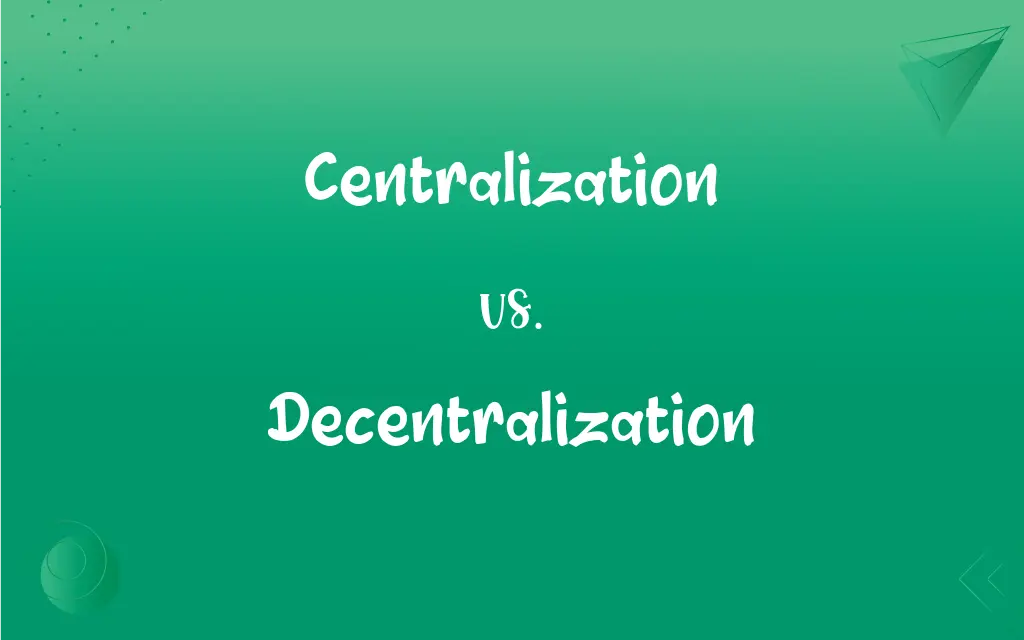Centralization vs. Decentralization: What's the Difference?
Edited by Aimie Carlson || By Harlon Moss || Updated on October 3, 2023
Centralization implies control and management concentrated in a single point, whereas decentralization disperses it across various entities or locations.

Key Differences
Centralization and decentralization fundamentally dictate how systems, organizations, or networks manage control and decision-making. Centralization points to a concentration of authority and decision-making power at a singular, often highest, point or authority. Conversely, decentralization reflects a system where control and decision-making are distributed or delegated across different levels or entities.
In centralization, authority, decision-making, and control are held within a single central point or a few key positions, often creating a hierarchical structure. Decentralization, however, encourages a flat or horizontal structure, where decision-making power is distributed among numerous entities, potentially encouraging autonomy and flexibility.
Examining examples of centralization and decentralization can clarify these concepts further. A centralized government, for instance, will hold most administrative and decision-making power at the national level, limiting local authority. In contrast, a decentralized government may permit local entities to govern themselves to a large extent, fostering autonomy and perhaps inciting unique regional regulations.
Centralization can streamline decision-making, enforce consistency, and possibly bring about unified direction, especially in contexts such as organizational structures. In the spectrum of decentralization, the widespread distribution of authority can lead to enhanced adaptability and potentially a higher degree of responsiveness to local needs or conditions, albeit with varied directions or strategies across entities.
Both centralization and decentralization bring along distinct advantages and drawbacks, depending upon the context of application, be it in management, government, or technological systems. Centralization may offer clear, uniform strategies but might lack in adaptability and localized responsiveness. Decentralization, while fostering autonomy and potentially enabling innovation, may encounter challenges in maintaining consistency and unified direction.
ADVERTISEMENT
Comparison Chart
Authority & Control
Concentrated in a central point
Distributed across various entities or levels
Decision-Making Speed
Potentially faster due to fewer decision-makers
May be slower due to distributed decision-making
Responsiveness
Might be less responsive to local or specific needs
Often more responsive to specific or local conditions
Structure
Tends to be hierarchical
Tends towards a flat or horizontal structure
Uniformity
Encourages consistency and uniformity
May result in varied strategies and policies
ADVERTISEMENT
Centralization and Decentralization Definitions
Centralization
Might limit the autonomy of sub-entities.
Centralization in school systems may limit individual school policy-making.
Decentralization
Potentially fosters a more adaptive system.
Environmental policy decentralization might adapt better to local ecosystems.
Centralization
Often establishes a clear, hierarchical structure.
Military centralization provides a clear chain of command.
Decentralization
May lead to varied strategies and solutions.
Economic decentralization can spawn diverse regional development plans.
Centralization
Can streamline and expedite decision-making.
Centralization in a crisis might enable rapid, unified responses.
Decentralization
Distributing authority across multiple entities.
Decentralization in federations allows states to enact their own laws.
Centralization
Ensures uniform decision-making across an entity.
Centralization in corporations ensures a unified strategic direction.
Decentralization
Enables autonomy and flexibility among sub-entities.
Decentralization in tech firms may encourage innovation in various departments.
Centralization
Concentrating control in a single central authority.
The centralization of power in monarchies often leads to singular decision-making.
Decentralization
Might complicate consistent policy enforcement.
Decentralization in health agencies might yield varied regional health practices.
Centralization
To draw into or toward a center; consolidate.
Decentralization
To distribute the administrative functions or powers of (a central authority) among several local authorities.
Centralization
To bring under a single, central authority
The Constitution centralizes political power in the federal government.
Decentralization
To bring about the redistribution of (an urban population and industry) to suburban areas.
Centralization
To come together at a center; concentrate.
Decentralization
To cause to withdraw or disperse from a center of concentration
Decentralize a university complex.
Decentralize a museum.
Centralization
The act or process of centralizing, or the state of being centralized; the act or process of combining or reducing several parts into a whole
The centralization of power in the general government
The centralization of commerce in a city
Decentralization
To undergo redistribution or dispersal away from a central location or authority.
Centralization
The act or process of centralizing, or the state of being centralized; the act or process of combining or reducing several parts into a whole; as, the centralization of power in the general government; the centralization of commerce in a city.
Decentralization
The action of decentralizing, or the state of being decentralized.
Centralization
The act of consolidating power under a central control
Decentralization
The action of decentralizing, or the state of being decentralized.
Centralization
Gathering to a center
Decentralization
The spread of power away from the center to local branches or governments.
Decentralization
The social process in which population and industry moves from urban centers to outlying districts
Decentralization
The spread of power away from the center to local branches or governments
FAQs
What might be a benefit of centralization in organizations?
Centralization can streamline decision-making and establish clear hierarchical structures.
What is centralization?
Centralization refers to concentrating control and decision-making in a single authority.
Is centralization common in authoritarian governments?
Often, centralization is a hallmark of authoritarian regimes, concentrating power and control.
Can centralization reduce internal conflict?
It might, by enforcing a singular direction and reducing disparate strategies.
How might decentralization affect cooperation among entities?
It could either foster cooperation through autonomy or hinder it due to varied goals.
Does decentralization foster autonomy?
Yes, decentralization often enables entities to have a degree of autonomy and flexibility.
Does centralization always provide clear leadership?
Generally, centralization provides clear, defined leadership and authority.
Can decentralization enhance local government efficacy?
Potentially, as it allows local governments to adapt to specific regional needs.
How does decentralization impact innovation?
Decentralization can potentially enhance innovation by allowing entities to explore varied strategies.
Does decentralization complicate unified decision-making?
It might, as diverse entities might prioritize different strategies and decisions.
Can centralization simplify administrative processes?
Yes, by enforcing uniformity, centralization can streamline administration.
Define decentralization.
Decentralization involves distributing control and decision-making across multiple entities.
Can centralization ensure consistent policies?
Yes, centralization typically ensures consistent and unified policies across an entity.
Can decentralization respond well to local needs?
Yes, decentralization can be more responsive and adaptive to specific local conditions.
Can decentralization lead to inconsistent policies?
Yes, decentralization might yield varied, potentially inconsistent policies across entities.
How does decentralization impact regional leadership?
Decentralization often enables regional entities to exercise leadership and control.
Can centralization hinder localized responsiveness?
It can, as centralization may prioritize uniformity over localized adaptation.
Can centralization impact decision-making speed?
Yes, centralization may expedite decision-making due to concentrated authority.
Does decentralization allow for varied policies?
Yes, decentralization often results in diverse policies and strategies across entities.
How might centralization impact lower-level autonomy?
Centralization may limit autonomy at lower levels due to concentrated decision-making.
About Author
Written by
Harlon MossHarlon is a seasoned quality moderator and accomplished content writer for Difference Wiki. An alumnus of the prestigious University of California, he earned his degree in Computer Science. Leveraging his academic background, Harlon brings a meticulous and informed perspective to his work, ensuring content accuracy and excellence.
Edited by
Aimie CarlsonAimie Carlson, holding a master's degree in English literature, is a fervent English language enthusiast. She lends her writing talents to Difference Wiki, a prominent website that specializes in comparisons, offering readers insightful analyses that both captivate and inform.
































































